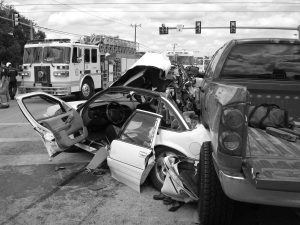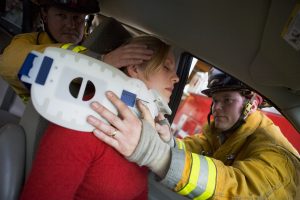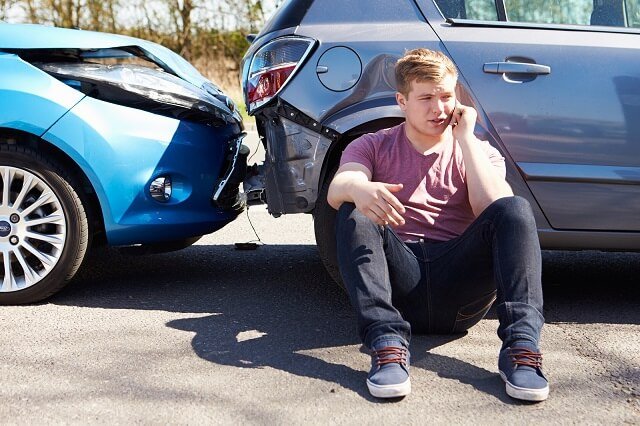The long-term effects of auto vehicle accidents can be subdivided into property damage, medical expenses, psychological disturbances, and financial losses. A strong car crash accident claim will demand the present value of the sum total of both current and future damages.
Nearly 40,000 people die in auto accidents every year – a figure that has seen a substantial increase ever since cell phone technology enabled texting. The financial losses that are caused by auto accident fatalities alone add up to $44 billion, a figure that is approximately equal to the entire annual GDP of the nation of Paraguay. Non-fatal injuries bring that total into the hundreds of billions.
Many of these losses were suffered by people who were involved in an accident that was not their fault, or that was at least mostly someone else’s fault. Unfortunately, only a fraction of the compensation that is due to these drivers and passengers is recovered in personal injury and wrongful death lawsuits. When calculating compensation, it is important to calculate the long-term losses, not just the losses that have already occured by the time a claim is filed.
Medical Consequences
The medical consequences of an auto accident are typically the most obvious, and they are often the most expensive. The following is a list of broad categories of bodily injuries that frequently occur in car crash accidents.
- Whiplash and other forms of soft tissue damage: Whiplash occurs when a person’s neck is snapped violently back and forth, as often occurs during sudden stops. Other forms of muscle, ligaments, and tendon injuries can also cause soft tissue damage. In some cases, these injuries can be painful, yet difficult to prove with medical evidence.
- Spine and back injuries: Spine and back injuries can result in lifelong paralysis or chronic pain, among other possible symptoms. Beware: Insurance companies are fond of attributing back and spine pain to pre-existing injuries.
- Cuts: Cuts that are not properly treated can lead to serious infections such as sepsis, a life-threatening disorder in which infection spreads throughout the entire body.
- Bone fractures: Bone fractures are common in auto vehicle accidents because the human body is fragile by nature. Bone fractures are relatively easy to prove, and in some cases, they result in lifelong disability.
- Burns: Burns occur in more than one way. A ruptured fuel line may cause an explosion, for example, or a victim may come into contact with hot metal. Another type of burn is generated through friction when the victim is dragged by the vehicle.
- Internal injuries: Organ damage occurs when an organ is ruptured from the outside or from a projectile that penetrates both the skin and the internal organ.
- Concussion and traumatic brain injury (TBI): TBI is a particularly common form of injury among motorcycle accident victims. Nevertheless, car and truck accident victims frequently experience this type of injury as well. The symptoms of TBI are often delayed for days or even weeks.
- Loss of limb(s): Accidents are responsible for about 50 percent of all missing limbs, and a high percentage of limb amputations occur as a result of car crash accidents. A missing limb can result in a variety of medical problems, including infections, blood clots, and phantom pains (a condition in which the victim seems to feel pain in a limb that no longer exists).
- Death: Nationwide, about 38,000 people died in auto accidents last year. When a death occurs, the victim’s probate estate administrator or certain close family members can file a wrongful death claim.
It is important that you seek medical treatment immediately after a vehicle accident. Some types of injuries are notoriously prone to late-breaking symptoms. If you delay medical treatment after an accident because you are not experiencing symptoms of an injury, then the insurance company is likely to assert that your injury was caused not by the car crash accident, but by something else that happened to you after the accident but before you sought medical attention.
Psychological Consequences
In addition to medical consequences, many auto accidents also carry psychological consequences. Some of the psychological consequences are a direct result of the medical consequences, and some are not.
- Depression: Depression is a consequence of any type of injury that involves severe bodily damage, serious pain, or severe psychological trauma. Changes in appetite (more or less), changes in sleep habits (more or less), a strong sense of sadness or loss, and loss of interest in daily activities are all symptoms of depression. Most cases of depression can be alleviated by medication within a few weeks.
- Personality Changes: Personality changes may appear in the victim of a car crash accident. These changes may be merely psychological (which doesn’t mean they’re not serious) or they may be physical effects of, say, a head injury. Confusion, delusions, hallucinations, and speech that “doesn’t make sense” are all possible manifestations of personality changes caused by a car crash accident – with or without a head injury.
- Pain and suffering: Pain and suffering are a direct result of an auto vehicle accident, because this term refers to the pain resulting from your injuries, not even counting the emotional anguish you might feel over, say, severe facial scarring. Back pain, for example, can cause chronic pain. In many (but not all) cases, the compensation for pain and suffering amounts to three to five times the amount of medical bills.
- Sleep disorders: Any highly stressful traumatic event, including a car crash accident, can cause a sleep disorder. Stress, unfortunately, activates certain brain chemicals that can make it difficult or even impossible to sleep. Even if you do get to sleep, you may experience nightmares or flashbacks of your accident.
- Anxiety: About 13 percent of Americans deal with some form of long-term anxiety disorder. Although most of these disorders are not caused by a car crash, some of them are. Indeed, some people develop anxiety disorders from simply witnessing a particularly devastating vehicle accident. Panic disorder, phobias, and even irritable bowel syndrome have all been linked to anxiety.
Financial Consequences
Car crash accidents cost the country billions of dollars every year. The various financial consequences arising from an auto accident may include:
- Damage to your car: A good car can cost $50,000 or more these days, and serious damage to your vehicle can result in a major loss. Since Connecticut switched from a “no-fault” auto insurance system to a “fault” auto insurance system in 1994, the at-fault driver’s liability insurance policy should cover damage to your vehicle – at least up to its policy limits.
- Medical expenses: Medical expenses can be immense in the United States – more so, in fact, than just about any other country. Indeed, such expenses easily rise into the six figures for a serious accident, and sometimes more than that. If you expect to incur long-term medical expenses, you will need to calculate the cost of future medical expenses and add them to your claim.
- Lifestyle adjustments due to disability: If your auto vehicle accident leaves you with a serious long-term physical disability, your home may have to be modified to account for your disability. If you become a paraplegic, for example, you will no longer be able to make it up the stairs and other arrangements will have to be made. These adjustments can be very expensive in some cases.
- Lost income: If you lost work time due to your accident, you may have a claim for lost income. In an extreme case, you may have been so seriously injured that you will never work again. In that case, you may be entitled to compensation for all of the estimated income you would have earned during the remainder of your working life. The more serious your disability, the younger you are, and the more money you make at the time of your accident, the more compensation in the lost income you are likely to be able to claim. The appropriate figure, however, can be particularly tricky to calculate.
- Loss of services: Even if you were not a member of the formal labor force, you may have performed valuable services that you can no longer perform – housework, child care, or yard work, for example. These are worth something, and their value can be calculated.
Proving Future Damages
If you suffered injuries that are expected to result in long-term or permanent disabilities, you are going to need to calculate the total cost of those disabilities and include them in your claim. It is imperative that you claim absolutely every dime that you will ever be entitled to before your claim is finalized, because once a decision has been made, it will be impossible for you to demand more money later.
Calculating future damages, especially medical expenses, is a highly speculative endeavor that will definitely require the services of an experienced injury lawyer and may even require the testimony of an expert witness. Of course, calculating the present value of future damages can be tricky in itself – but that is just the tip of the iceberg.
Let Berkowitz Hanna Join Your Fight for Justice
If you were injured in a vehicle accident that was more than 50 percent the fault of someone else, you are probably entitled to compensation under Connecticut law. The same applies under Connecticut’s wrongful death law, if your loved one was killed in a vehicle accident for which someone else was mostly responsible.
Berkowitz Hanna can help you investigate and prove your case. After all, that’s what we do for a living, and that is what we are passionate about. Call us directly or contact us online for a free, confidential initial consultation where we can listen to your story and answer your questions. Remember: We work on a contingency basis, which means that our services are free of charge unless we win your case. We can afford to do this because we win almost all of our cases.





